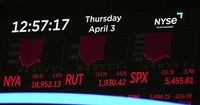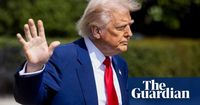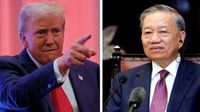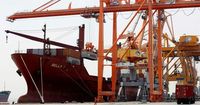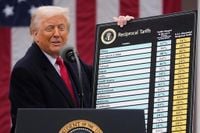As global markets grapple with the fallout from President Donald Trump's sweeping new tariffs, concerns are mounting over the potential economic repercussions. On April 4, 2025, the stock market experienced its worst one-day sell-off since 2020, with the tech-heavy Nasdaq Composite plummeting by 6% and the S&P 500 sinking nearly 5%. The Dow Jones Industrial Average tumbled 4%, marking the fifth-worst drop in its history, as investors reacted to the uncertainty surrounding Trump's trade policies.
Trump's announcement on April 2, dubbed "Liberation Day," introduced a baseline 10% tariff on all countries, effective from April 5, 2025. However, it was the retaliatory measures from China that intensified market fears. On April 4, China announced it would impose a 34% tariff on all U.S. products starting April 10, 2025, a move that many analysts believe will exacerbate the ongoing trade war.
Federal Reserve Chair Jerome Powell weighed in on the situation, suggesting that the inflationary impacts of the tariffs may not be temporary, as previously thought. "It is now becoming clear that tariff increases will be significantly larger than expected," Powell noted during a conference in Arlington, Virginia. He emphasized the need to keep inflation expectations anchored, warning that the economic effects could include higher inflation and slower growth.
In a bold declaration, Trump insisted on social media that his policies would "never change," even as he touted a "very productive call" with Vietnam's leader, To Lam. Trump claimed that Lam expressed Vietnam's desire to reduce tariffs to zero if a favorable agreement could be reached. This comes as Vietnam faces a staggering 46% tariff on its exports to the U.S., effective April 9, 2025. The Southeast Asian nation, which has a trade surplus with the U.S. exceeding $123 billion, is eager to negotiate terms that would alleviate the financial burden on its economy.
As the tariffs took effect, various industries braced for the impact. Analysts from Wedbush warned that the new tariffs could lead to a significant increase in consumer prices, with predictions that the cost of an iPhone could soar to $3,500 due to the cascading effects of tariffs on tech products. The automotive sector is also feeling the strain, with a report estimating that the auto import tariffs could cost U.S. consumers over $30 billion in higher prices and lower sales in the first year.
In the wake of Trump's tariff announcements, the global response has been swift and severe. Countries like Madagascar, which exports 70% of its vanilla production to the U.S., are facing tariffs of 47%, threatening the viability of their economies. Meanwhile, Taiwan's President Lai Ching-te has pledged to support industries impacted by the tariffs, acknowledging the unreasonable nature of the trade measures.
Wall Street's reaction has been tumultuous, with major indexes suffering significant losses. The S&P 500 dropped 2.7% early on April 4, 2025, following a disastrous trading day where stocks fell sharply. Oil prices also took a hit, dropping as much as 8% as concerns over a potential recession loomed large. The financial sector, particularly banks, saw a nearly 6% decline, reflecting fears that the trade war could lead to a broader economic downturn.
As the situation evolves, Trump's administration faces pressure not only from international partners but also from within the U.S. political landscape. Critics, including Democratic leaders, have condemned the tariffs as the "biggest tax hike in American history," arguing that they endanger the savings and pensions of everyday Americans. Illinois Governor JB Pritzker expressed frustration over the economic turmoil, stating, "Donald Trump’s tariffs are throwing the economy into the tank."
The complexities of the trade war are further underscored by the reactions from global leaders. Canada's Prime Minister Mark Carney has vowed to retaliate against the tariffs, while Mexico's President Claudia Sheinbaum has indicated that her country will not engage in a tit-for-tat trade war but will announce a comprehensive program to address the situation.
In a bid to navigate these turbulent waters, Trump's administration has signaled openness to negotiate with trading partners. The Commerce Secretary indicated that countries willing to increase imports of U.S. goods could see their tariffs reduced. This approach aims to reshape global trade dynamics in favor of American products, though the effectiveness of such negotiations remains to be seen.
As the dust settles from the initial shockwaves of "Liberation Day," the long-term implications of these tariffs will likely unfold in the coming weeks and months. Economists warn that the combination of rising tariffs, retaliatory measures, and shifting trade relationships could lead to a prolonged period of instability in both domestic and global markets.
With the stakes higher than ever, all eyes will be on the upcoming negotiations between the U.S. and its trading partners, as well as the Federal Reserve's response to the evolving economic landscape. The potential for a full-blown trade war looms large, and the consequences could reshape the global economy for years to come.
